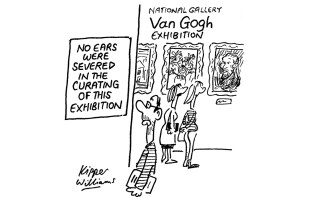American Football are a band whose legend was formed by the internet: some Illinois college kids who made an album for a little label in 1999, went their separate ways, and in their absence found that a huge number of people had responded to their music. They duly reunited in 2014. They are often identified as emo, the most confounding of all genre names, given it means everything and nothing, but American Football are not of the eyeliner and dyed-hair variety exemplified by My Chemical Romance, nor the angsty pop-punk variant of Weezer or Jimmy Eat World, nor the shouty hardcore punk evolution of the genre’s founders in the 1980s.
There was nothing remotely punky about American Football, who are now middle-aged men, recreating their feelings as teenagers for the benefit of thirtysomethings reliving their own adolescence. (It was one of the most homogenous crowds I’ve ever seen: almost entirely aged between 30 and 40. Every millennial moper in London seemed to be there.) Their music is intricate – all spidery guitar lines and unusual drum patterns and bass that throbs rather than propels. This is why they also get lumped in with another genre, known as math rock, due to its entirely unfunky devotion to sterile precision (American Football certainly owe a debt to the Kentucky band Slint’s album Spiderland).
They were awfully good, making their intricacy seem as natural as shelling peas. And I hated every single moment. That’s very unfair of me, since large chunks of what I hated was the solipsism – which, presumably, they have grown out of since leaving college – and solipsism is pretty much the point of teenage lyric writing. Except it only works when your audience is in the same place as you in life, and I did not hear American Football as a kid. At 55, a song called ‘I’ll See You When We’re Both Not So Emotional’ just makes me want to roll my eyes. (To be fair, the band themselves have noted the strangeness of trying to sing, as adults, songs written by overwrought kids.)
Instead of revisiting any old feelings in the Roundhouse, I sat wanting to scream warnings from history at the rest of the audience: ‘Wake up, sheeple! This is how we end up with Miranda July films! Stop, for the sake of humanity!’
It didn’t help that this music represents one of my least beloved types of indie: that peculiarly American variety that emerged in the late 1990s (see also Modest Mouse or the Postal Service) of emotional oversharing set to music that was melodic without ever presenting a tune. The signifiers of tunes are there – chord changes, arpeggios, that stuff – but it’s all mood, never quite pulling into focus. You get tons of musicians rhapsodising about the life-changing effects of the first American Football album (Matty Healy of the 1975 is a big fan and has had them open for his band). But no one should trust the taste of musicians, as everyone who went out and bought records in the 1980s because Michael Stipe or Morrissey recommended them will know.
Much more fun was Friday night’s pairing of British psychedelia – Gruff Rhys, from Wales and Jane Weaver, from the north-west. These days, Rhys is one of British music’s beloved slight eccentrics – his band all took to the stage wearing GR Logistics overalls and Rhys announced they were available for deliveries. The music wasn’t hard to comprehend, often leaning into country rock, and the tunes here were not drowned out by fiddling around. But Rhys’s mumbly baritone sometimes disappeared into the eaves, when one wanted to hear what he was singing.

Jane Weaver, who opened, was flatly brilliant. It remains baffling why, 20 years into her career, she isn’t headlining these shows. Her voice comes from the English folk tradition – vibratoless and high and pure – but she pairs with it unexpected music. At times it was very Hawkwind, all implacable drone and thudding momentum. And then, on ‘The Revolution of Super Visions’, it became a sort of hyper-coloured bouncy funk, like Talking Heads but less earnest. ‘Love in Constant Spectacle’ was an anaesthetised, woozy near-power ballad.
If she had an American accent and told everyone she was queer, I suspect Weaver would be playing the Royal Albert Hall. But she’s from Widnes and has two kids and maybe she doesn’t catch the imagination like St Vincent does, which is wildly unfair because she’s every bit the British answer to St Vincent in both musical curiosity and singularity of vision. She makes everything sound different, but unmistakably hers.







Comments